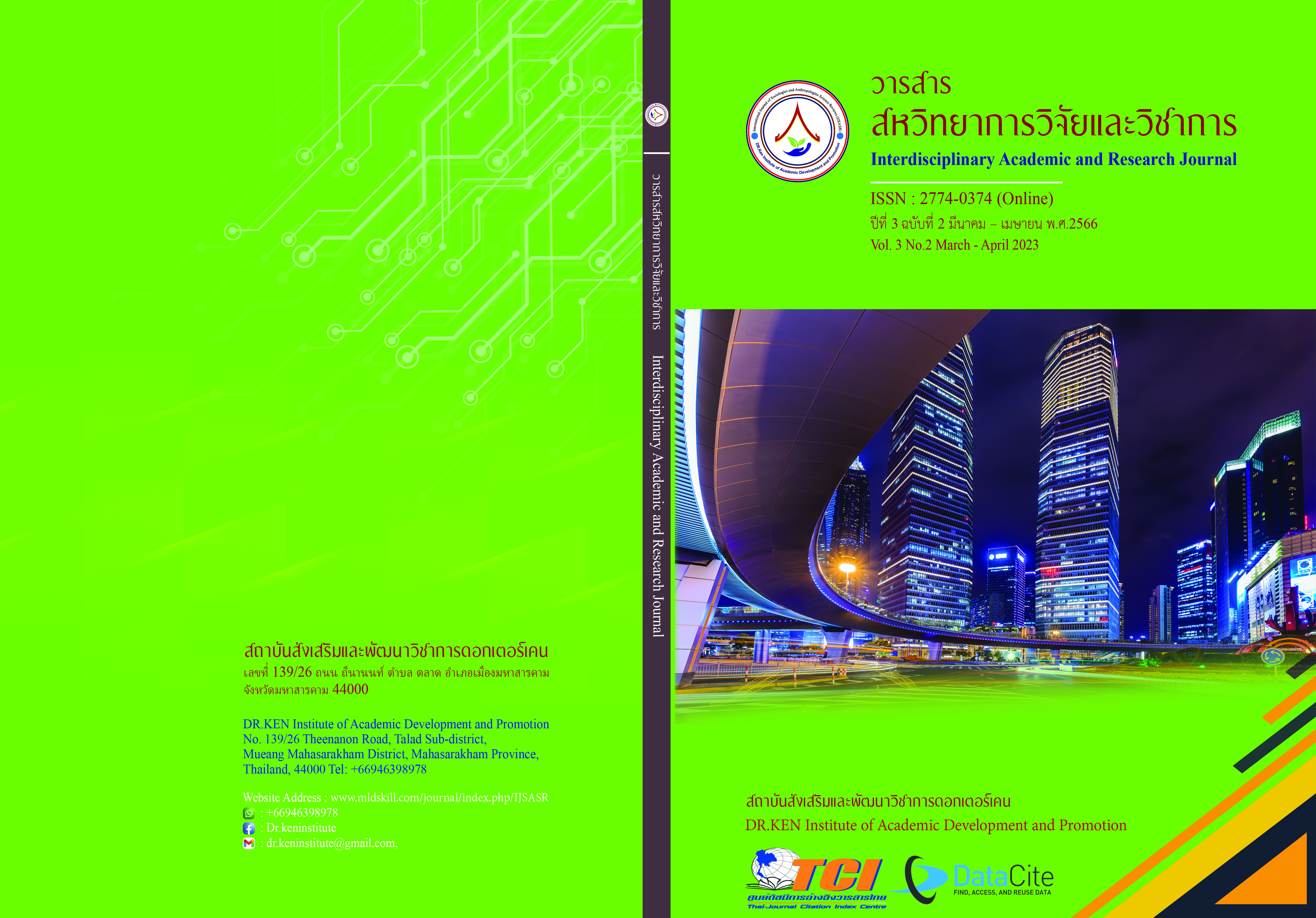Management of Educational Institute Curriculum of Affiliated Educational Institutes under Ubon Ratchathani and Amnat Charoen Secondary Educational Service Area Office
DOI:
https://doi.org/10.14456/iarj.2023.57Keywords:
Curriculum Management; , Secondary Education Service Area OfficeAbstract
Curriculum implementation is a critical step in curriculum development as it conveys the ideology, curriculum aims, subject content, and a carefully curated learning experience to the learner. All course developers agree on the importance of the course implementation process as being more important than all other steps, directly indicative of the success or failure of the course. This research aims to (1) study the level of curriculum management of educational institutions under the Office of Ubon Ratchathani and Amnat Charoen Secondary Education Service Area. And (2) compare the level of opinions towards educational institution curriculum management classified by position, work experience, and education level. The sample consisted of 355 personnel in educational institutions under the Office of Ubon Ratchathani and Amnat Charoen Secondary Education Service Area. The research tools include questionnaires to collect data from questionnaire submissions. The statistics used in the research were frequency, mean, percentage, standard deviation, F-test, and t-test. The research results showed that (1) the management of the school curriculum of educational institutions under the Office of Ubon Ratchathani and Amnat Charoen Secondary Education Service Area overall was at a high level. And (2) a comparative analysis of the educational curriculum management practices of schools under the Office of Ubon Ratchathani and Amnat Charoen Secondary Educational Service Area Office, both overall and in each aspect, it was found that; (a) Classified according to the overall position and the side is not different, (b) Classified by work experience in general and in each aspect is not different, and (c) classified according to the level of education as a whole and each aspect was not different at the statistical significance level of 0.05.
References
ชนาพร เมฆดี. (2565). การศึกษาสภาพและแนวทางการบริหารหลักสูตรสถานศึกษา สังกัดสำนักงานเขตพื้นที่การศึกษามัธยมศึกษา ในจังหวัดพิษณุโลก. Journal of Roi Kaensarn Academi. 7(4), 167- 183.
ธีรศักดิ์ อุปรมัย อุปไมยอธิชัย. (2565). การบริหารและการจัดการศึกษาสู่การพัฒนาที่ยั่งยืน. พิษณุโลก :สำนักพิมพ์มหาวิทยาลัยนเรศวร.
ธีริทธิ์ อิ่นคำ. (2561). แนวทางการบริหารจัดการหลักสูตรสถานศึกษา โรงเรียนราชประชานุเคราะห์ 15 (เวียงเก่าแสนภูวิทยาประสาท) เพื่อรองรับการจัดการเรียนการสอนในเขตเศรษฐกิจพิเศษ. วารสารครุศาสตร์วิชาการ มหาวิทยาลัยราชภัฏเชียงราย. 3(2), 216- 231.
นัยนา จันทรสมัย. (2564). การพัฒนาหลักสูตร. Retrieved April 25, 2022 from: https://sites.google.com/site/viewnaiyana/karna-hlaksutr-pi-chi.
บุญชม ศรีสะอาด. (2553). การวิจัยเบื้องต้น. พิมพ์ครั้งที่ 8. กรุงเทพฯ : สุวีริยาสาส์น.
สำนักงานเขตพื้นที่การศึกษามัธยมศึกษาอุบลราชธานี อำนาจเจริญ. (2565). สรุปรายงานการรับนักเรียนของโรงเรียนในสังกัด. อุบลราชธานี : สำนักงานเขตพื้นที่การศึกษามัธยมศึกษาอุบลราชธานี อำนาจเจริญ.
สำนักงานเลขาธิการสภาการศึกษา. (2560). คู่มืองานการบริหารสถานศึกษา. กรุงเทพฯ : โรงพิมพ์คุรุสภาลาดพร้าว.
สำนักวิชาการและมาตรฐานการศึกษา (2553). ชุดฝึกอบรมการวัดและประเมินผลการเรียนรู้. หลักสูตรแกนกลางการศึกษาขั้นพื้นฐาน พุทธศักราช 2551. กรุงเทพฯ: โรงพิมพ์ชุมนุมสหกรณ์การเกษตรแห่งประเทศไทย.
Yamane, T., (1973 ). Statistics: An Introductory Analysis. 3rd Edition. New York: Harper and Row. Publications.
Yunhuo Cui. (2020). School Curriculum Administration in China. Jilin : Jilin Education Press.
Downloads
Published
How to Cite
Issue
Section
License
Copyright (c) 2023 จักรพรรดิ์ ชื่นภิรมย์

This work is licensed under a Creative Commons Attribution-NonCommercial-NoDerivatives 4.0 International License.
Copyright on any article in the Interdisciplinary Academic and Research Journal is retained by the author(s) under the under the Creative Commons Attribution-NonCommercial-NoDerivatives 4.0 International License. Permission to use text, content, images, etc. of publication. Any user to read, download, copy, distribute, print, search, or link to the full texts of articles, crawl them for indexing, pass them as data to software, or use them for any other lawful purpose. But do not use it for commercial use or with the intent to benefit any business.
















.png)


